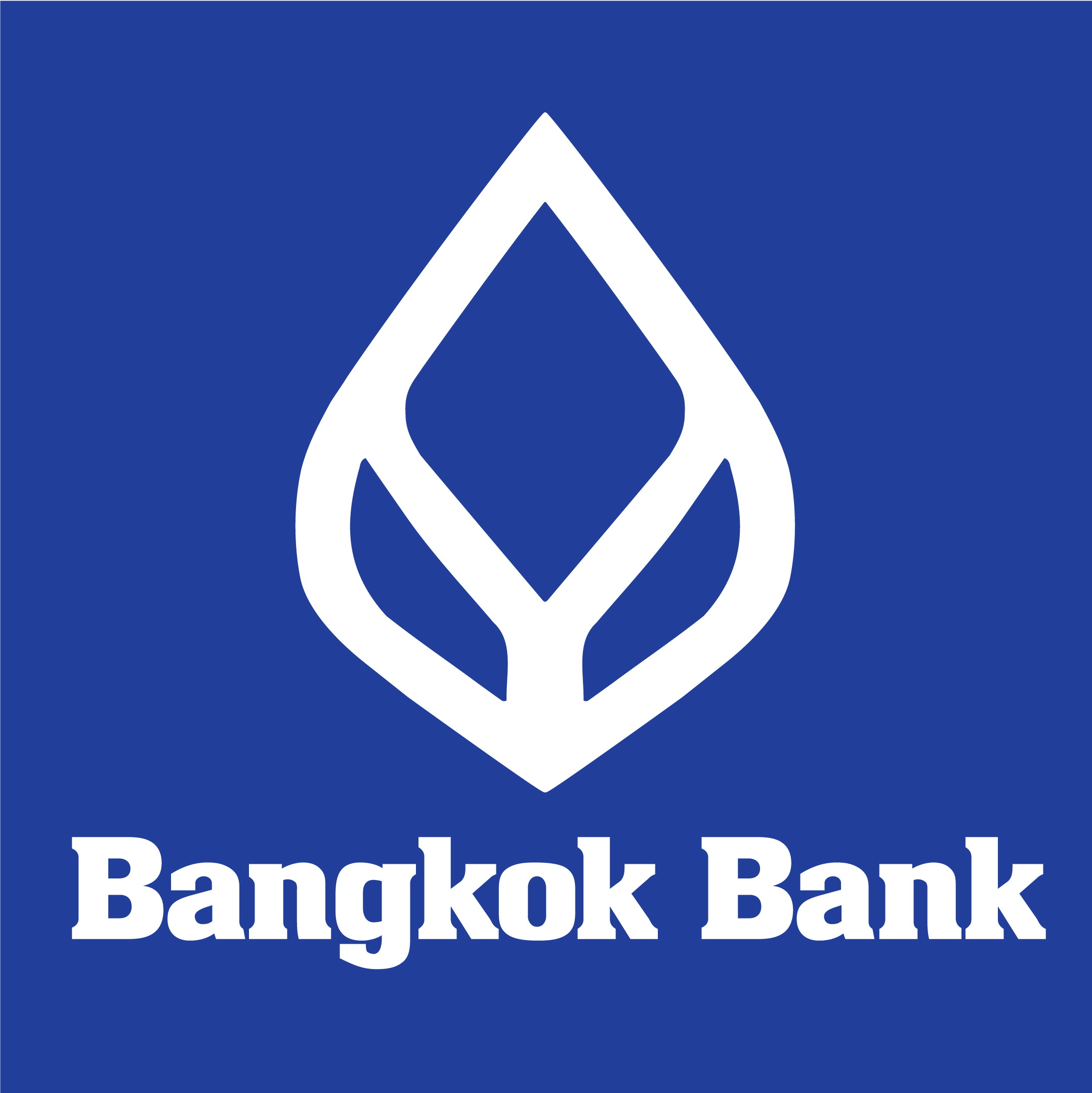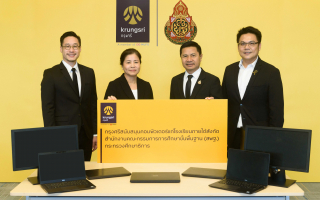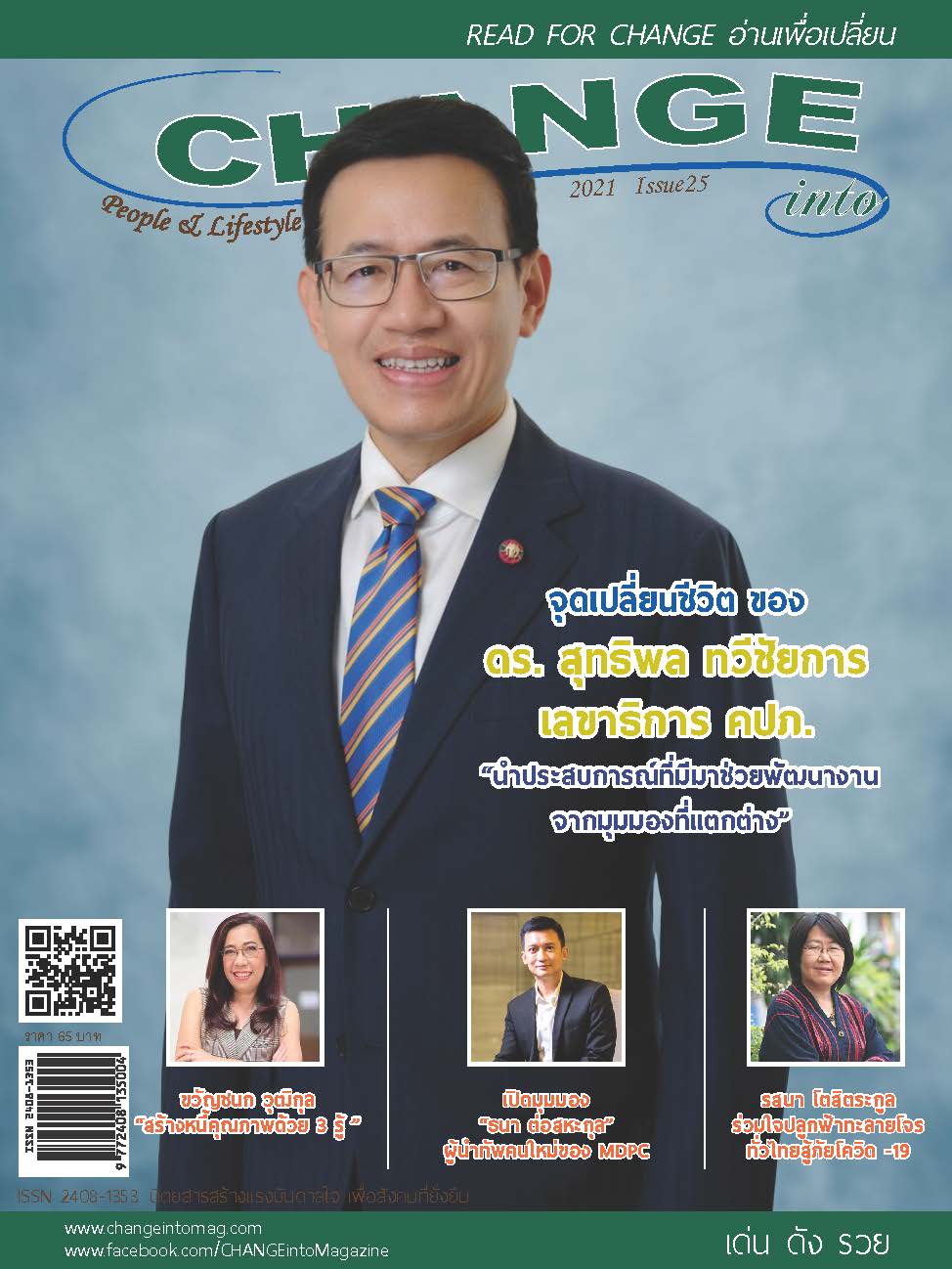ธนาคารกรุงเทพรายงานกำไรสุทธิสำหรับปี 2563 จำนวน 17,181 ล้านบาท

ธนาคารกรุงเทพรายงานกำไรสุทธิสำหรับปี 2563 จำนวน 17,181 ล้านบาท
ในปี 2563 การแพร่ระบาดของโควิด-19 ส่งผลกระทบต่อเศรษฐกิจโลกและไทยอย่างกว้างขวาง นับเป็นวิกฤตที่รุนแรงที่สุดในรอบหลายทศวรรษ ภาคธุรกิจโดยเฉพาะอย่างยิ่งภาคส่งออกและภาคท่องเที่ยวได้รับผลกระทบจากมาตรการควบคุมการแพร่ระบาด ด้วยการปิดเมืองและการจำกัดการเดินทางระหว่างประเทศ
ส่งผลกระทบต่อการจ้างงานและการใช้จ่ายของภาคครัวเรือน ในช่วงไตรมาส 3 รัฐบาลได้คลายมาตรการปิดเมืองและออกมาตรการกระตุ้นเศรษฐกิจต่าง ๆ ทำให้กิจกรรมทางเศรษฐกิจของประเทศเริ่มปรับตัวดีขึ้น อย่างไรก็ตาม
ในช่วงปลายปี เศรษฐกิจไทยเข้าสู่ภาวะฟื้นตัวได้ช้าลงเนื่องจากความต้องการบริโภคซึ่งสะสมมาจากช่วงที่มีการปิดประเทศค่อย ๆ หมดไป ประกอบกับเกิดการแพร่ระบาดของโควิด-19 ระลอกใหม่ อันอาจส่งผลกระทบต่อเศรษฐกิจหากเกิดการระบาดในวงกว้าง
เพื่อลดผลกระทบจากการแพร่ระบาดของโควิด-19 รัฐบาลและธนาคารแห่งประเทศไทย (ธปท.) ได้ออกมาตรการต่าง ๆ เพื่อช่วยประคับประคองและสนับสนุนการฟื้นตัวของเศรษฐกิจอย่างต่อเนื่อง โดยได้หารือกับสถาบันการเงินในการดูแลลูกหนี้ที่ได้รับผลกระทบอย่างเป็นระบบและเหมาะสมกับลูกหนี้แต่ละประเภท อย่างไรก็ตาม
การฟื้นตัวของเศรษฐกิจในช่วงต่อไปยังคงมีความไม่แน่นอนสูง ทั้งจากความเสี่ยงของการระบาดระลอกใหม่ของ
โควิด-19 มาตรการควบคุมการแพร่ระบาด ประสิทธิผลและการกระจายวัคซีนป้องกันโควิด-19 รวมถึงช่วงเวลาของการเปิดรับนักท่องเที่ยวจากต่างประเทศอีกครั้งหนึ่ง ธนาคารจึงยังคงติดตามสถานการณ์และดูแลลูกค้าอย่างใกล้ชิด รวมถึงให้ความสำคัญในการดูแลกระบวนการอำนวยสินเชื่อและบริหารความเสี่ยงด้วยความระมัดระวังและรอบคอบ ควบคู่กับการดำรงฐานะการเงิน สภาพคล่อง และเงินกองทุนให้อยู่ในระดับที่แข็งแกร่ง
ธนาคารกรุงเทพต้อนรับธนาคารเพอร์มาตาเข้าเป็นสมาชิกใหม่ในกลุ่มธุรกิจการเงิน
ธนาคารกรุงเทพในฐานะที่เป็นธนาคารขนาดใหญ่ที่สุดในประเทศไทยและเป็นธนาคารขนาดใหญ่อันดับ 6 ในเอเชียตะวันออกเฉียงใต้เมื่อพิจารณาจากสินทรัพย์รวม ได้ต้อนรับธนาคารเพอร์มาตาในประเทศอินโดนีเซียเข้าเป็นสมาชิกใหม่ในกลุ่มธุรกิจการเงินของธนาคารในปี 2563 โดยธนาคารกรุงเทพได้เข้าถือหุ้นธนาคารเพอร์มาตาทั้งสิ้นร้อยละ 98.71 และได้ดำเนินการรวมสาขาของธนาคารกรุงเทพในประเทศอินโดนีเซียเข้ากับธนาคาร
เพอร์มาตาอย่างเป็นทางการตั้งแต่วันที่ 21 ธันวาคม 2563 ทำให้ธนาคารเพอร์มาตาเป็น 1 ใน 10 สถาบันการเงินที่ใหญ่ที่สุดในอินโดนีเซียเมื่อพิจารณาจากสินทรัพย์รวม นับเป็นการเสริมสร้างศักยภาพการให้บริการทางการเงินเพื่อตอบสนองความต้องการของลูกค้าในการดำเนินธุรกิจในภูมิภาคอาเซียนได้ดียิ่งขึ้น ซึ่งการดำเนินการในครั้งนี้สอดคล้องกับกลยุทธ์ของธนาคารในการเสริมสร้างรากฐานเพื่อการเติบโตอย่างมั่นคงและยั่งยืน
กำไรสุทธิของธนาคารกรุงเทพและบริษัทย่อยปี 2563 มีจำนวน 17,181 ล้านบาท
ในปี 2563 ธนาคารกรุงเทพและบริษัทย่อยมีรายได้ดอกเบี้ยสุทธิเพิ่มขึ้นร้อยละ 8.4 จากปี 2562 มาอยู่ที่ 77,047 ล้านบาท เป็นผลจากการรวมรายได้ดอกเบี้ยสุทธิของธนาคารเพอร์มาตา โดยมีส่วนต่างอัตราดอกเบี้ยสุทธิ
อยู่ที่ร้อยละ 2.25 ขณะที่รายได้ค่าธรรมเนียมและบริการสุทธิและรายได้จากการดำเนินงานอื่นลดลง สาเหตุหลักจากค่าธรรมเนียมจากการอำนวยสินเชื่อและรายได้จากเงินลงทุน จากการนำมาตรฐานกลุ่มเครื่องมือทางการเงิน
ฉบับใหม่ (ฉบับที่ 9) มาถือปฏิบัติกับงบการเงินสำหรับรอบระยะเวลาบัญชีตั้งแต่วันที่ 1 มกราคม 2563 สำหรับค่าใช้จ่ายจากการดำเนินงานเพิ่มขึ้นร้อยละ 20.0 หลัก ๆ จากการรวมค่าใช้จ่ายของธนาคารเพอร์มาตา และค่าใช้จ่ายเกี่ยวกับการควบรวมสาขาในประเทศอินโดนีเซียเข้ากับธนาคารเพอร์มาตาในเดือนธันวาคมที่ผ่านมา ส่งผลให้อัตราส่วนค่าใช้จ่ายต่อรายได้จากการดำเนินงานอยู่ที่ร้อยละ 55.6
ธนาคารตั้งสำรองผลขาดทุนด้านเครดิตที่คาดว่าจะเกิดขึ้นจำนวน 31,196 ล้านบาท ทำให้อัตราส่วนค่าเผื่อผลขาดทุนด้านเครดิตต่อเงินให้สินเชื่อที่มีการด้อยค่าด้านเครดิตอยู่ที่ร้อยละ 181.6 เป็นการเตรียมความพร้อมตามหลักความระมัดระวังอย่างต่อเนื่อง เพื่อรองรับความไม่แน่นอนของสภาวะเศรษฐกิจที่หดตัวจากการแพร่ระบาดของโควิด-19
ท่ามกลางความท้าทายทางเศรษฐกิจที่หดตัวทั่วโลกจากผลกระทบของโควิด-19 ธนาคารกรุงเทพยังคงยึดมั่น
แนวทางการดำเนินธุรกิจด้วยความระมัดระวังและรอบคอบ ควบคู่กับการดำรงฐานะการเงิน สภาพคล่อง และเงินกองทุนให้อยู่ในระดับที่แข็งแกร่ง เพื่อรักษาเสถียรภาพทางการเงินที่ยั่งยืน และเตรียมพร้อมรองรับการดำเนินธุรกิจตาม
บริบทใหม่ (New Normal)
ณ สิ้นเดือนธันวาคม 2563 ธนาคารมีเงินให้สินเชื่อจำนวน 2,363,338 ล้านบาท เพิ่มขึ้นร้อยละ 14.7 จากสิ้นปี 2562 หากไม่รวมธนาคารเพอร์มาตา เงินให้สินเชื่อเพิ่มขึ้นร้อยละ 2.7 ส่วนใหญ่จากสินเชื่อลูกค้าธุรกิจรายใหญ่ สำหรับอัตราส่วนเงินให้สินเชื่อที่มีการด้อยค่าด้านเครดิตต่อเงินให้สินเชื่อรวมอยู่ที่ร้อยละ 3.9 โดยธนาคารยังคงให้ความสำคัญในการดูแลกระบวนการอำนวยสินเชื่อและบริหารความเสี่ยง ควบคู่กับการดำรงค่าเผื่อผลขาดทุน
ด้านเครดิตให้อยู่ในระดับที่เหมาะสม
ด้านเงินกองทุนและสภาพคล่อง ณ วันที่ 31 ธันวาคม 2563 ธนาคารมีเงินรับฝากจำนวน 2,810,863 ล้านบาท เพิ่มขึ้นร้อยละ 18.6 จากสิ้นปี 2562 หากไม่รวมธนาคารเพอร์มาตา เงินรับฝากเพิ่มขึ้นร้อยละ 7.3 ส่วนใหญ่จาก
เงินรับฝากออมทรัพย์ สำหรับอัตราส่วนเงินให้สินเชื่อต่อเงินรับฝากอยู่ที่ร้อยละ 84.1 สะท้อนถึงสภาพคล่องที่เพียงพอในการรองรับความไม่แน่นอนทางเศรษฐกิจ นอกจากนี้ ในวันที่ 23 กันยายน 2563 ธนาคารออกตราสารหนี้ด้อยสิทธิที่สามารถนับเป็นเงินกองทุนชั้นที่ 1 ของธนาคารภายใต้หลักเกณฑ์ Basel III จำนวน 750 ล้านดอลลาร์สหรัฐฯ
เพื่อเสริมสร้างโครงสร้างเงินกองทุนของธนาคารให้มีความเหมาะสมมากยิ่งขึ้น โดย ณ สิ้นเดือนธันวาคม 2563 ธนาคารมีอัตราส่วนเงินกองทุนทั้งสิ้น อัตราส่วนเงินกองทุนชั้นที่ 1 และอัตราส่วนเงินกองทุนชั้นที่ 1 ที่เป็น
ส่วนของเจ้าของต่อสินทรัพย์เสี่ยงของธนาคารและบริษัทย่อยอยู่ที่ร้อยละ 18.3 ร้อยละ 15.7 และร้อยละ 14.9 ตามลำดับ ซึ่งอยู่ในระดับที่สูงกว่าอัตราส่วนเงินกองทุนขั้นต่ำตามที่ธนาคารแห่งประเทศไทยกำหนด
การนำมาตรฐานกลุ่มเครื่องมือทางการเงินฉบับใหม่มาถือปฏิบัติ
ธนาคารและบริษัทย่อยได้นำมาตรฐานกลุ่มเครื่องมือทางการเงินฉบับใหม่ (ฉบับที่ 9) มาถือปฏิบัติ
กับงบการเงินสำหรับรอบระยะเวลาบัญชีตั้งแต่วันที่ 1 มกราคม 2563 เป็นต้นไป โดยไม่ปรับงบการเงินเปรียบเทียบย้อนหลัง การเปลี่ยนแปลงที่สำคัญ ได้แก่ การจัดประเภทและการวัดมูลค่าสินทรัพย์และหนี้สินทางการเงิน
การคำนวณการด้อยค่าของสินทรัพย์ทางการเงินโดยใช้ผลขาดทุนด้านเครดิตที่คาดว่าจะเกิดขึ้น (Expected Credit Loss) การบัญชีป้องกันความเสี่ยง และการรับรู้รายได้ดอกเบี้ยเงินให้สินเชื่อโดยใช้วิธีอัตราดอกเบี้ยที่แท้จริง (Effective Interest Rate: EIR)
Bangkok Bank reports 2020 net profit of Baht 17,181 million
In 2020, the Covid-19 pandemic caused the greatest disruption seen in decades to both the global and the Thai economies. Businesses, especially in the export and tourism sectors, were affected by government measures to control the spread of the virus, such as lockdowns and international travel bans. This hampered both the employment and consumption of households. In the third quarter, the government lifted city lockdowns and introduced various stimulus measures, helping economic activities to recover. However, after an initial surge in demand following the lifting of the lockdown, the pace of the rebound slowed and new domestic
Covid-19 cases surged. The latter development could adversely impact the economy
if infections become more widespread.
The government and the Bank of Thailand (BOT) launched a series of measures to mitigate the effects of the pandemic and to help sustain the economy, including discussing the situation with financial institutions to support debtors facing financial difficulties in systematic and appropriate ways. However, the economic recovery remains fragile and highly uncertain due to the new wave of domestic outbreaks, control measures to reduce the spread of the virus, the efficacy and distribution of vaccines, and progress of protocols for admitting foreign tourists.
In this regard, the Bank continues to closely monitor the situation and maintain support for customers, while continuing to focus on its prudent approach towards credit underwriting and risk management as well as maintaining a sound financial position, and liquidity and capital reserves to support its financial sustainability.
Bangkok Bank welcomed Permata as a new member of its financial group
In 2020, Bangkok Bank, Thailand’s largest bank by total assets and the 6th largest Southeast Asian bank, acquired a stakeholding of 98.71 percent in PT Bank Permata Tbk (Permata) in Indonesia, welcomed it as a new member of its financial group and officially integrated Bangkok Bank Indonesia’s branches into Permata’s operations since December 21, 2020. This integration has made Permata one of Indonesia’s 10 largest banks by total assets. These synergies will enable the Bank to provide enhanced financial services to support customers operating in ASEAN,
in line with the Bank’s strategy to strengthen its foundation for sustainable growth.
Bangkok Bank and its subsidiaries reported a net profit of Baht 17,181 million
In 2020, the Bank’s net interest income rose by 8.4 percent from 2019 to Baht 77,047 million due to the consolidation of Permata’s net interest income.
The net interest margin stood at 2.25 percent. Net fees and service income and other operating income declined primarily due to lower fee income from loan related services and income from investments from the implementation of TFRS 9 since January 1, 2020. Operating expenses increased by 20.0 percent mainly due to the inclusion of Permata’s operating expenses and expenses related to integration of Bangkok Bank’s branches in Indonesia and Permata in December, resulting in the cost to income ratio of 55.6 percent.
The Bank set aside expected credit losses of Baht 31,196 million, driven the ratio of loan loss reserves to non-performing loans to 181.6 percent. This is in line with the Bank’s prudent management to provide a cushion against uncertainty from the economic contraction caused by the Covid-19 pandemic.
Throughout the global economic contraction from Covid-19, Bangkok Bank is continuing its prudent approach toward business management while maintaining a sound financial position, liquidity and capital reserves to support financial sustainability and prepare for the “New Normal”
At the end of December 2020, the Bank’s loans amounted to Baht 2,363,338 million, an increase of 14.7 percent from the end of 2019. Excluding Permata, loans grew by 2.7 percent due mainly to increases in large corporate lending. The
non-performing loan (NPL) ratio was 3.9 percent. The Bank continued to keep close control of credit underwriting and risk management while maintaining the allowance for doubtful accounts at a prudent level.
In terms of capital and liquidity, as of December 31, 2020, the Bank’s deposits amounted to Baht 2,810,863 million, an increase of 18.6 percent from the end of December 2019. When excluding Permata, deposits increased by 7.3 percent mainly from savings accounts. The loan to deposit ratio was 84.1 percent, reflecting an adequate liquidity position to cushion against economic uncertainties. Furthermore, the Bank issued USD 750 million in additional Tier 1 Subordinated Notes under Basel III regulations on September 23, 2020, to strengthen the Bank’s capital structure. At the end of December 2020, the total capital adequacy ratio, Tier 1 capital adequacy ratio and Common Equity Tier 1 capital adequacy ratio of the Bank and its subsidiaries were 18.3 percent, 15.7 percent, and 14.9 percent respectively, comfortably above the BOT’s minimum capital requirements.
Implementation of new financial reporting standards (group of financial instruments)
The Bank and its subsidiaries adopted TFRS 9 from January 1, 2020 onwards, without restating previous financial statements. The principal changes can be summarized into classification and measurement of financial assets and liabilities, calculation of impairment using the concept of expected credit loss, hedge accounting, and the change in recognition of interest income from loans using the effective interest rate (EIR) method.



















